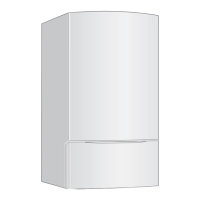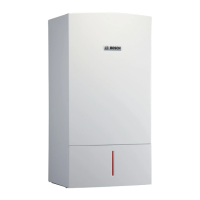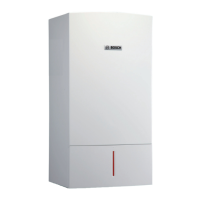Explanation of symbols and safety instructions
3
Condens 5000W – 6720813953 (2018/12)
Any other use is considered inappropriate. We assume
no liability for damage occurring due to non-permitted
use.
H If you smell gas
A gas leak could potentially cause an explosion. If you
smell gas, observe the following rules.
▶ Prevent flames or sparks:
– Do not smoke, do not use a lighter or strike
matches.
– Do not operate any electrical switches or unplug
any equipment.
– Do not use the telephone or ring doorbells.
▶ Turn off the gas supply at the main shut-off valve or
at the gas meter.
▶ Open windows and doors.
▶ Warn your neighbours and leave the building.
▶ Prevent anyone from entering the building.
▶ Move well away from the building: call the
emergency services and the gas supplier.
H Danger to life from poisoning by flue gas
There is a danger to life from escaping flue gas.
▶ Never modify any parts through which flue gas is
routed.
If flues are damaged or leaking, or if you smell flue gas,
observe the following rules.
▶ Switch off the heat source.
▶ Open doors and windows
▶ Warn your neighbours and leave the building
immediately.
▶ Prevent third parties from entering the building.
▶ Notify an approved contractor.
▶ Have any defects rectified.
H Danger to life from carbon monoxide
Carbon monoxide (CO) is a poisonous gas, which
arises during the incomplete combustion of fossil fuels
such as oil, gas or solid fuels.
Dangers arise, if carbon monoxide escapes from the
heating system due to a fault or a leak and collects
unnoticed in enclosed spaces.
You can neither see, taste nor smell carbon monoxide.
To avoid danger from carbon monoxide:
▶ Have the heating system inspected and serviced
regularly by an approved contractor.
▶ Use a CO detector, which gives an alarm in good
time if CO escapes.
▶ If you suspect a CO leak:
– Warn your neighbours and leave the building
immediately.
– Call an approved contractor.
– Have any defects rectified.
H Inspection and maintenance
If there is a lack of cleaning, inspection or
maintenance, or if these are carried out incorrectly,
this may result in material damage and/or personal
injury, including possible loss of life.
▶ Have work carried out only by an approved
contractor.
▶ Have any defects rectified immediately.
▶ Have the heating system inspected once a year by
an approved contractor, and have any required
maintenance or cleaning work carried out.
▶ Have the heat source cleaned at least every two
years.
▶ We recommend that you enter into a contract
covering an annual inspection and needs-based
maintenance with an approved contractor.
H Conversion and repairs
Improper modifications to the heat source or other
parts of the heating system can result in personal
injury and/or material damage.
▶ Have work carried out only by an approved
contractor.
▶ Never remove the casing of the heat source.
▶ Never carry out any modifications to the heat
source or to other parts of the heating system.
▶ Never close the outlet of the pressure relief valves.
Heating systems with DHW cylinder: During heat-
up, water can escape from the pressure relief valve
of the DHW cylinder.
H Open flue operation
The installation location must be adequately
ventilated, if the heat source draws its combustion air
from the room.
▶ Never cover or reduce the size of ventilation
openings in doors, windows and walls.
▶ Consult a contractor to ensure that ventilation
requirements are met:
– If structural modifications are made (e.g.
replacing windows and doors)
– If devices with an air discharge to the outside are
subsequently installed (e.g. extractor fans,
kitchen fans or air conditioning units).

